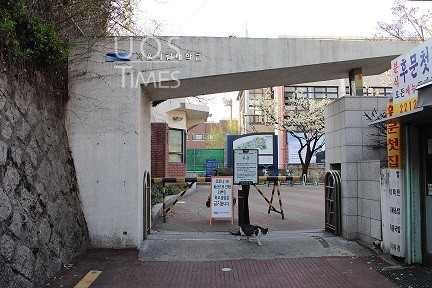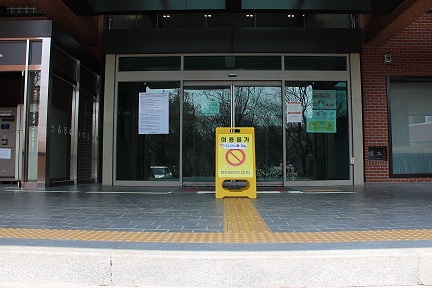
<Measures on the Campus>
In 2020, the term "Social Distancing" has newly emerged with the coronavirus. Many countries ordered high-intensity social distancing measures to prevent the spread of the virus, and those measures are unavoidably affecting the overall social economy. The University of Seoul (UOS) has also taken the following steps to curtail the spread of the virus.
1) UOS finally announced on April 23rd to extend the period of its online-only class to the entire semester. Students could join their class in a variety of ways such as ZOOM or MICROSOFT TEAMS. Of course, inevitable confusion arose as face-to-face lectures are not possible. Cha Hye-jin (Dept. of Public Administration, ’18) said, "I could have more personal time during the home lecture period because I saved commute time. Being able to see again what I missed in class is also nice. However, it is very confusing that each professor uses different methods for conducting the lectures. "

2) UOS is strictly restricting outsiders from entering the building. Gates are all shut down except for the main gate of the building. No one can enter the building without an ID card that is provided for UOS members. The card is used to verify one's identification, but if the security system does not recognize your ID card, go to the University Center to register your card first. UOS also placed thermal imaging cameras at the Student Hall, Main Library, and University Center to prohibit access by people with a fever. Wearing a mask is also essential when you visit inside those buildings.
3) Although the Main Library has just gone through remodeling, students cannot use the facilities of the library. That's because UOS started to limit the library access after Feb. 25. Under the restrictions, students can no longer study in the study room. Permission is only valid for lending books. In addition, the library in the Centennial Memorial Hall is totally closed. However, as many students complain of inconvenience, UOS announced that it will partially open the reading rooms in only the Main Library from April 27. These restrictions will continue until further notice.
4) The bookstore in UOS is providing a delivery service during the online-only class period. This service will help students who have difficulty in buying their textbooks offline. Contact the announced phone number in the related notice on the UOS website if you need this service. In addition, the bookstore has temporarily moved to another location because of construction. Therefore, if you want to visit the bookstore, go to the 1st floor of the 21st-century Building.
<Measures taken for Students on Overseas Exchange Programs>
There are cases where the coronavirus unavoidably led to disruptions in the exchange student programs: students returning home without completing their semesters in foreign countries, students coming back shortly after they were dispatched, and students remaining in the dispatched country, voluntarily or unwillingly. Among them, we interviewed a student who returned home shortly after being sent abroad and a student who is staying in the dispatched country.
Student S, who asked for anonymity said, "I actually did not want to come back, but I decided to come back to Korea because of my family's concerns." S was supposed to spend this semester in Poland but came back to Korea in late March. “When I was taking an exchange student lecture, the school suddenly told me to go home because there will be no lectures for a while. Since then, the school office has also been closed, making it difficult to get further guidance.” S was told the online lectures will be held, but it is now canceled. It was difficult for her to find a plane ticket, but she was able to leave the country in a hurry a day before a lockdown was imposed and that the Polish border was blocked. "When I was in Poland, the coronavirus was not yet in a state of great pandemic: people did not wear masks, and there was not much damage. However, on my way back to Korea, I got a mask and wore it." When S returned, only those who entered from a few foreign countries including the Americas, were obliged to quarantine. Although S was not the person in question, S installed an application on her smartphone for diagnosing symptoms and followed the instructions. Through the application, S checked her health symptoms. “I think I was not quarantined and inspected unlike those who returned home from other countries because I was from a country where it had sealed off its borders long before the virus spread.” S said that compared to students that were sent from other universities, UOS left it to the individual choice of students rather than actively encouraging them to return home. Therefore, it seems that individual students were able to cope with the situation effectively, as the situation differs in different countries.
Another interview was with student J who went to Russia to study. J also asked for anonymity and said, “I left the Korea in late February. At that time, we were classified as people from the high-risk region. as it was a time when there was a surge in confirmed cases in Korea." As soon as J arrived at the airport in Russia, J was sent to a hospital for examination which lasted for about three hours. They checked the body temperature of people from Korea, Japan and Italy. J was quarantined at a hospital in the university because J’s body temperature was 37 °C. J was immediately tested for the coronavirus and tested negative for it, so J was sent to a solitary cell. After that, J had his body temperature checked more than 10 times a day, also went through blood tests and lung tests. “I was released from quarantine eight days later, but I had to visit the center every day for a checkup for the next two weeks.” J's answer shows that the coronavirus diagnostic test in Russia was quite long and meticulous. "I wanted to come back at that time, but I had submitted my passport for my visa and couldn't get my passport back because of the closure of government offices, so I had no choice but to stay in Russia. Moreover, as the number of flights decreased and I was not sure if the plane could take off, I gave up returning to Korea.” Now, J is studying online. Also, people are prohibited from going out except for going to the hospital or buying daily necessities. “All shops and companies are closed, and exchange students, including me, who have not received their passports back, try not to go out unnecessarily because if they go out, they may get a random check-up.” In the beginning of J’s days in Russia, it is said that local people did not wear any masks, but now everyone wears a mask. “I always wear a mask when I go outside, but people stare at me a lot and sometimes ask me why. Furthermore, in the downtown, there is some discrimination caused by the coronavirus: there are cashiers refusing to accept payment, and people on the road coughing intentionally as they pass by.”
As such, each student could make different choices, but in common, their choices were limited as the number of flights decreased. Moreover, it has become impossible to predict the progress of the upcoming exchange student programs. Most of the short-term dispatch planned for the summer has been cancelled and the students will be given a chance in the next semester. The exchange student program for the fall semester is currently undergoing the paperwork process, but there is a possibility of change in the schedule depending on the situation of each country in the future.
Yi Se-won
devel0ppe@uos.ac.kr
Jeong Ji-eun
jjen1026@uos.ac.kr

